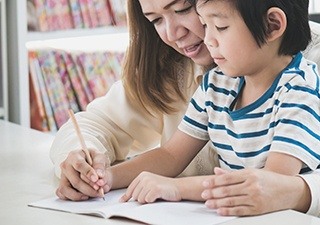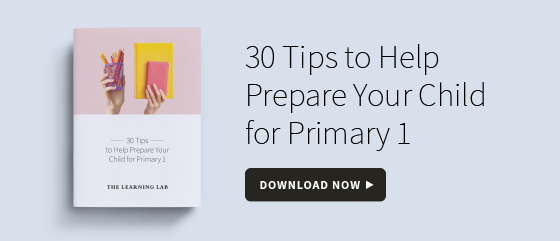
It’s that time of the year — your child is about to embark on a new stage in his or her life!
When do you register your child for Primary 1? The registration for admission to Primary 1 classes is open from Wednesday, 29 June 2022 to Monday, 31 October 2022. The excitement is palpable as you count down to your child's first day of primary school.
Without any tests or topical reviews at the preschool level, it may be difficult for you to determine areas that your child may need help with before entering primary school.
So what exactly can you and your child expect in his or her Primary 1 journey?
It’s a whole new adventure for the next six years of their lives and we would like to guide you through the next few months together.

Tip 1:
Encourage Good Reading Habits Early
Parents are usually concerned when their kids have difficulty with reading and writing before entering Primary 1. It is worth noting that children learn best when the stories they read are able to captivate their interest.
To help our preschool students develop literacy skills, we have a structured incentivised reading programme to increase reading proficiency with frequent library visits to encourage good reading habits and weekly interactive storytelling sessions to nurture a love for books.
Our students are familiar with spelling drills, are able to read confidently and are exposed to a range of excellent authors and genres and school work (cloze passages, poetry, comprehension passages, grammar, sentence construction and writing exercises).
As our worksheets are all developed in-house, we aim to cover diverse topics such as Science and Technology, Current Affairs and Animals, to captivate our young minds and expand their horizons.
What’s more, our libraries house more than 77,000 specially curated books, shelved according to our recommendations for different levels that encourage our students of all ages to extend their learning beyond the classroom.
Read: 5 Ways to Kindle a Passion for the Wondrous World of Reading

Tip 2:
Encourage Positivity
Do not breed fear in your young child by telling them that if they are naughty or do not listen in class, the teacher will scold them severely.
Instead, encourage them to do their best. Our approach is to nurture by picking up on our students' good habits (such as completing tasks positively or being helpful) and praising or rewarding them accordingly, to encourage more of such behaviour.

Tip 3:
Expect a Totally New Timetable and Schedule
From early morning wake up times to having their mornings broken down into longer periods (what would be a 15- to 20-minute activity in kindergarten will now stretch into longer 30-minute sessions in primary school), your child will require a lot of adjustment to his or her routine.
Unfortunately, this means that parents have to adjust their sleep schedules too (the dreaded early morning start), but things do fall into place quickly! This is a major change for the little ones, so do plan for your child to have adequate sleep.

Tip 4:
Set Up a Timetable for Your Child
Explain the daily routine to them: Mondays to Fridays are spent in school and family activities happen on the weekends. Talk to them about what time they will be in school and who will look after them after school (child care/family members/helpers).
Keep to a regular routine so that they can get used to it. Such structure gives them comfort. Remember to add in playtime (free play/playground time) for a balance lifestyle.

Tip 5:
Familiarise Your Child With the Journey to School
Do a dry run of the transportation route that your child will take to and from school. Time the journey and check the traffic at the actual drop off and pick up time to get a sense of how parents and caregivers can manage the logistics.
Have your child go on these journeys, so that they can recognise the routes and let them know who is picking them up and at what time. The idea is to familiarise them with the journey so that it doesn’t catch them unaware.

Tip 6:
Teach Your Child to Focus for Longer Periods Of Time
Set short tasks for your child (e.g. practise writing simple words) and extend it to longer periods.
Kindergarten children do have short attention spans (they wiggle, cannot stay in their seats for a long time, need to move constantly and are used to shorter activities) and that is perfectly fine.
However, some training or routine work really helps them to focus (on the teacher and tasks at hand) and not get lost in a sea of 30 classmates to 1 teacher.
To put things into perspective, our K1 and K2 students are exposed to a highly structured lesson format on a weekly basis. In a lesson of 1 hour 45 minutes, we break the tasks down into short segments, games, worksheets, a library visit, videos and activities (singing/dramatic movement/choral recitation) in between to appeal to their senses and multiple intelligences.
Our students are familiar with working in a classroom setting; taking responsibility for their books and learning. Gradually, they get used to paying attention for extended periods of time. This helps them to focus and learn well, especially when they begin formal schooling.
Primary 1 and 2 students at TLL learn to write down the work for the week in a contents page and homework page, to do corrections and to file their worksheets upon completion.

Tip 7:
Inculcate Independence
Apart from simply focusing on academics, it is crucial for students to learn independence, assume accountability and take responsibility for their belongings.
In our classes, our students are taught independence by being trusted to manage their school bags and stationery, return and borrow their library books, take pride in their work via document management (such as filing worksheets).
After our students complete written work in class, we take the time to leave written feedback to parents on their worksheets so that parents can track their progress.
We go to great lengths to get our students into a routine and to have a sense of ownership over their work, belongings and classrooms.

Tip 8:
Stay Calm and Parent
If you are a parent who is sending your child to primary school for the first time, chances are that you are likely to feel anxious and excited concurrently for your child.
First and foremost, it is important that you manage your own anxiety in a positive manner before you allay your child’s concerns.
Children are perceptive beings and are incredibly sensitive to their parents’ feelings — so parents need to manage their emotions first and not put undue pressure on their children.

Tip 9:
Set Goals With Your Child for This New School Year — Academic, Health, Hobbies And Relationships
What activities do they like and what do they want to pursue? How can they relate to friends?
It can be weekly, monthly and termly goals, such as get to know two new friends a week, or read 5–10 books in a month etc.

Tip 10:
Maintain an Ongoing Conversation With Your Child
When Primary 1 starts, children will often be excited to talk about their new experiences, so be ready to lend a listening ear and share their excitement.
You can even tell your child stories about your school days — show them photos, your old report card and uniform.
Our teachers often share our own anecdotes and we make time during lessons to affirm students when they tell us snippets of their day. It makes them feel acknowledged, loved and we delight in their milestones and enthusiasm.
We have more tips on how you can get your child comfortably settled into Primary 1. Read the full 30 tips by downloading this printable guide here.

Uplifting the Primary School Experience
At The Learning Lab, we believe in helping you and your child assimilate comfortably into the new routines and expectations of primary school life through a multi-faceted support system that uplifts your child’s academic and personal growth in these vital childhood years.
As educators, this means not only imparting the requisite skills to your child but also the right mindset and attitude to approach any challenges that life puts in their way. We would love to be a part of your child's primary school journey. Click here to find out more about how we can prepare your child for Primary 1.
The Learning Lab is now at locations. Find a location that suits your needs.
If you have any questions about our programmes, please email us at enquiry@thelearninglab.com.sg or call us at 6733 8711 and we will be happy to assist you.



